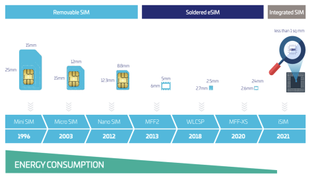Mobile industry is quietly preparing for the biggest change to your smartphone in a decade — iSIM will hasten the end of SIM cards and allow networks to preload plans on devices
10 million iSIMs are expected in the next two years

The mobile industry is poised to undergo a significant transformation in the next two years, with the impending shift to integrated SIMs, or iSIMs, new research has claimed.
A new study from Juniper Research predicts a huge increase in the global number of iSIMs installed in connected devices, jumping from 800,000 in 2024 to over 10 million by 2026.
The release of GSMA's SGP.41/42 specifications, expected by the end of 2025 year, will drive the anticipated 1,200+ percent growth. These guidelines will standardize and streamline iSIM-enabled device rollout.
Anticipated surge in connections
An iSIM (also known as the iUICC - Integrated Universal Integrated Circuit Card) is based on the eSIM (embedded SIM) form factor and integrated in the device’s processor, effectively removing the need for a separate SIM module. The iSIM's integration looks likely to propel us towards an era where the traditional SIM card will become obsolete and networks will preload plans onto devices.
The GSMA's SGP.41/42 specifications establish the framework for In-factory Profile Provisioning (IFPP) capabilities. IFPP enables the upload of iSIM profiles onto a device during production, enabling the shipment of devices with pre-configured cellular connectivity to the desired network.
Juniper’s report points out that “Despite the increased readiness, it is important to note that there is no industry-wide standard for iSIM technology as of yet. Without a standard, manufacturers will not be willing to risk launching a solution that is not compliant with an official standard.”
Elisha Sudlow-Poole, the author of Juniper Research’s report adds, “eSIM vendors must ensure that they provide standard-agnostic platforms that are flexible to upcoming form factors, standards and use-case demands. Additionally, eSIM vendors must develop trusted partnerships with manufacturers to ensure adoption of iSIM connectivity services once it becomes demanded in the market.”
Are you a pro? Subscribe to our newsletter
Sign up to the TechRadar Pro newsletter to get all the top news, opinion, features and guidance your business needs to succeed!
Juniper's study expects to see the number of iSIM connections surge to 210 million worldwide by 2028, thanks to adoption opportunities in scenarios such as smart energy meters and remote logistics, where there's a need for power-conscious and small form factor devices.
More from TechRadar Pro

Wayne Williams is a freelancer writing news for TechRadar Pro. He has been writing about computers, technology, and the web for 30 years. In that time he wrote for most of the UK’s PC magazines, and launched, edited and published a number of them too.
Most Popular


